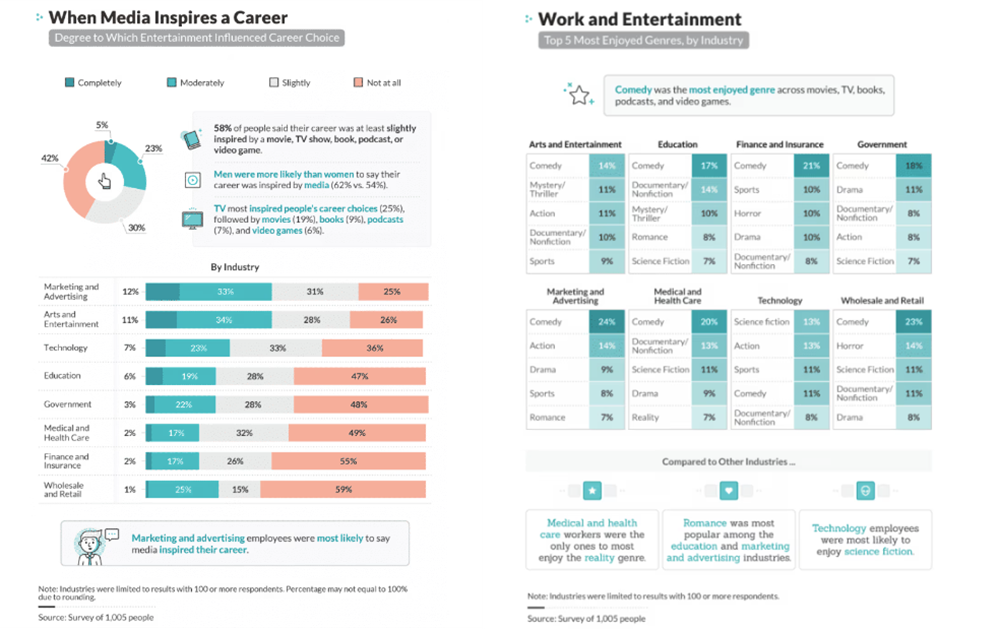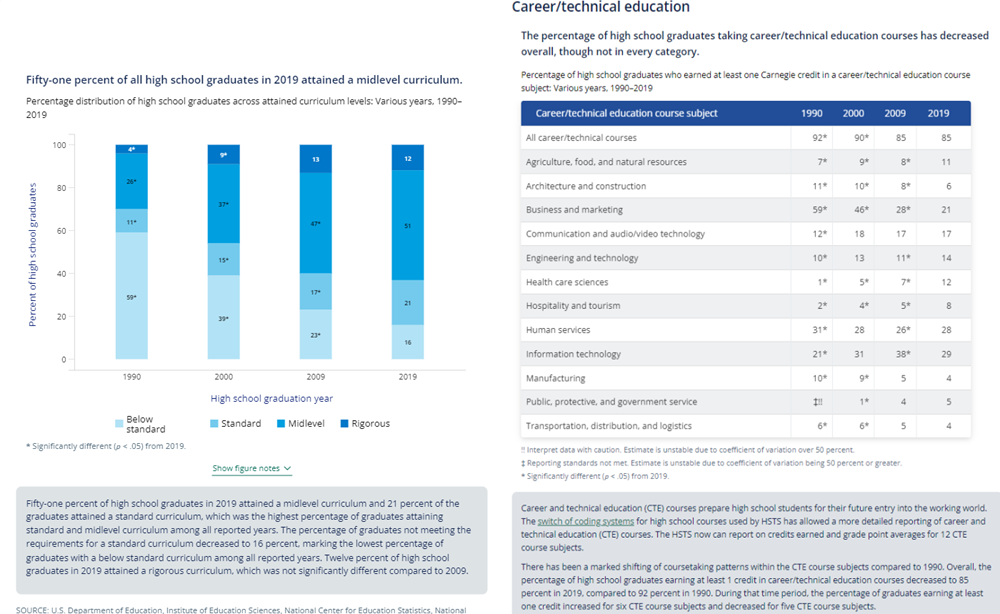In November 2023, Jobbing.com published a report Gen Z and The Uncertain Future of Trades. In the report, they summarized three reasons why there are more than 500,000 skilled trades jobs unfilled. While each generation is unfairly labeled ‘lazy’ by their older generational counterparts, Gen Z has the dubious distinction of having taken the most rigorous high school academic courses vis a vis Millennials and Gen Z has the lowest number of students enrolled in CTE as compared to Gen X or Millennials. One would surmise that Gen Z is full of overachievers, but this generation has been maligned by the media as being a group of entitled quiet-quitters that lack any semblance of resiliency. Perception, however, is not aligned with reality.
Jobbing.com surveyed over 1,000 recent high school graduates (ages 18-20) in October, 2023 and found that Generation Z has had attainment of a four year college degree drilled into them one of a select few methods to obtain upward mobility. Here are several key findings:
There is a significant stigma associated with vocational schools and trades and it’s clear that parents are contributing to this.
- 74% of respondents say that there’s a stigma associated with going to a vocational school over a traditional four-year university.
- 79% of respondents say their parents want them to pursue a college education after high school and only 5% say the same about vocational school.
What high school graduates want for their careers isn’t necessarily what their parents want for their children.
- 75% of respondents say they are interested in exploring vocational schools that offer paid, on-the-job training.
- Job security was identified as the most important factor for selecting a career by respondents.
- When it comes to AI, 56% of respondents believe that “blue-collar” jobs have more job security than “white-collar” desk jobs.
High school graduates demonstrate a lack of understanding when it comes to the earning potential of certain home service industries.
- The majority of respondents don’t believe that tree maintenance, landscaping, residential cleaning, and plumbing businesses can earn over $1 million in revenue per year, but this is not the case. For example, 60% of tree care businesses and 65% of landscaping businesses earn $1 million per year.
Gen Z is looking for entrepreneurial opportunities service businesses provide whether they realize it or not.
- Nearly two-thirds of respondents want to start a business at some point in their lives and 11% already have.
- 41% of respondents are most interested in starting a business that either doesn’t require formal training or has low upfront costs. Residential cleaning, power washing, and lawn maintenance businesses are examples of home service careers that fit this criteria.
Jobbing.com, boomers, ‘the mainstream media’ and the like all want to point to parents as the source of misalignment. It is both difficult and naive to label parents as the root cause of Gen Z not seeking the trades. My assessment – It is cultural. I took liberties here and used extremely unscientific methods to arrive at a different root cause of the stigma with trades and technical schools. I believe it is cultural and there are many groups that can share in the blame. Let me start with how I arrived at this conclusion.
First, I examined if the media has any effect on career selection. In 2020, ZenBusiness surveyed 1,005 people to determine when media inspires a career. ZenBusiness also revealed that across all industries surveyed, comedy was by far the most enjoyed genre.

Secondly, since comedies as a genre were looked upon favorably by most workers across a diverse set of industries; I wondered: has the nature of comedy shifted? Who is portrayed and what does that say about us? A proxy measure (I told you this was unscientific) is imdb.com’s top five comedies by decade. I looked at comedies over five decades from the 70s, 80s, 90s, 00s and 10s and a pattern emerges.
| Sitcom | Sitcom | Sitcom | Sitcom | Sitcom | |
| 1970 – 1979 | All In The Family | Happy Days | Good Times | Sanford & Son | Laverne & Shirley |
| 1980 – 1989 | The Cosby Show | Cheers | Family Ties | Married With Children | Roseanne |
| 1990 – 1999 | Seinfeld | Friends | Fraizer | Home Improvement | King of the Hill |
| 2000 – 2009 | Friends | The Office | Modern Family | Scrubs | Big Bang Theory |
| 2010 – 2020 | Parks & Rec | Brooklyn 99 | Modern Family | Louie | Insecure |
Culturally speaking, Americans went “all in” on educational attainment and the shift happened from the 80s to the 90s. Being a self-proclaimed “cultural zeitgeist”, I am going to call the exact point in time: when Frazier was spun off from Cheers. Precisely at that moment, Americans became politically correct and demanded all forms of grammar from country to Kelsey. Seriously, I want all of y’all to think about this for a second. We went from watching citizens from different social classes, from a wide range of industries socializing in a pub together (Cheers) to watching Frazier. Frazier – a well to do psychiatrist living in a luxury penthouse in downtown Seattle with an iconic view of the Space Needle whose idea of wild fun is running with scissors. Let this sink in for a second.
If that weren’t enough, in the 2000s, popular sitcoms focused on educated yet frustrated professionals as if this was the only representation of America. In 2021, Variety Magazine published “Why Blue Collar Stories Are Rarely Told on TV” and while anecdotal, the prevailing sentiment amongst TV lit people is that viewers are aspirational and want to see success in others as a form of escapism. Not only is this answer lazy, it is just plain wrong. Just look at the screenwriters, producers and agents that populate the entertainment industry and it should be no surprise that these writers are byproducts of the meritocracy push two decades earlier to obtain a four year degree. This push, unfortunately, crowds out early exposure to trades careers and, in my opinion, produces writers with a bias toward themes and stories that fit their worldview.
As Figure 3 illustrates, the percentage of students taking rigorous courses increased by 3x from 1990 to 2019. However, the number of students enrolled in CTE courses (Career Technical Education) dropped from 92% in 1990 to 85% in 2019.

How Do We Solve the Skilled Labor Crisis?
Mike Rowe In 2024? No. A knee jerk reaction to this situation is to appeal to congress for funding for CTE, robust infrastructure stimulus and an increased pay package to resolve this issue. If pay were the issue, we would see shows like “Million Dollar Landscapers” instead of “Million Dollar Listings”. Sadly, one area DEI has not touched upon in detail is credentialism as an accepted form of prejudice inside and outside the workplace. Several government agencies and Fortune 500 firms have eliminated the requirement of having a bachelor’s degree for jobs in favor of a skills based approach. While this is a step in the right direction, it does not change the perception of skilled labor as a less than ideal career path.
I am going to throw out a few ideas to close this gap. One is benign, the other two are radical.
- (Benign) Increase The Occupational Prestige Of Trades.
Shout out and props to Home Depot, for outlining a route to go “Pro” by entering the trades. Is it self-serving? Of course it is. No shame in their game.

It also serves as a source of pride for thousands that put in enormous effort to hone their skills on a daily basis. Hard labor is hard. Period. Ignoring those that unceremoniously put in the effort to make our lives easier says more about us as a society and culture. This lack of gratitude and appreciation needs to change. This serves as an open call to any individual that has the authority and responsibility to increase the occupational prestige of trades. If you need some ideas, I am here for you.
As the son of a Vietnam era veteran that grew up on military bases in the 70s and 80s in Northern California, my dad’s job was not cool. Protestors against nuclear weapons and war in general would toss fruit at our school bus as it left the base. My father was pragmatic, however, and explained that he put his life on the line so they could have the right to protest, but throwing fruit went too far as it was just blasphemous to throw away perfectly edible organic apples. I followed in his footsteps and joined the family business (the military). 25 years later, I have strangers thanking me for my service and retailers throwing unsolicited veterans discounts at me like a Major League pitcher. While I love the attention and adoration, I do think about the crap my father went through and to be 100% honest, I feel kind of bad about it. Why? I did it [joined the military] for the money. Guilt aside. My point is this: If we can change the perception of military service from hippies throwing fruit at kids to everyday veterans getting red carpet celebrity treatment, then we can change the perceptions of the trades amongst parents, potential life partners and hiring managers.
2. (Radical) Expand What It Means To Be Educated – Please.
The statistics can be found here, here and here regarding work, dating and marriage for millennials and Gen – Z. As women continue to outperform men in college attendance and attainment of credentials, it does have a negative impact on their dating patterns and how partners are selected. According to the Institute for Family Studies, for single, college educated women, college attendance can qualify or disqualify a potential partner.

Fairness or unfairness aside, if skills based hiring is becoming the norm, then skills based dating should follow. For example, there are over 1.1 million electricians in the USA with a median income of $60,000. It is shocking to me that while electricity is ubiquitous, few understand the rigors and intense training required to become an expert practitioner in the craft. Put it another way, the mere fact that a person in that field lives to show up to work another day has to mean something. Now, if you have a vehicle, especially an electric one, open up the hood and try to figure out how it works. It’s technical and very challenging. Imagine if you have to work on one of these EVs AND an ICE (internal combustion engine) of various makes and models. You would think of yourself as educated wouldn’t you?
3. (Radical) Kill Cancel Culture – Start Acceptance Culture
As I was writing this, I found this funny, albeit hurtful and insulting bit on the Sherri Shepherd show. The character is poking fun at online education and a large institution of higher learning that focuses on non-traditional students.

Abbott Elementary isn’t alone in their disparaging of schools that cater to non-traditional students. Saturday Night Live, Borat (Sascha Baron Cohen) and the comedian Godfrey have all poked fun at these schools. As a believer in free speech, they are free to state what they want, especially if it has comedic merit.
On the other hand, where is the call out for acceptance? Our meritocratic society is supposed to evaluate skills and performance. Unfortunately, there is a stigma associated with trades and technical schools that is totally acceptable to use to marginalize the graduates of those schools and/or dissuade students from actually attending those schools. Graduates don’t get a chance to show their skills. In a tight labor market that is extremely competitive, culturally speaking; why are we creating our own headwinds?
David J Deming and his team at Harvard in 2014 conducted a study of employer perceptions of for-profit colleges. It is summarized below:
We study employers’ perceptions of the value of postsecondary degrees using a field experiment. We randomly assign the sector and selectivity of institutions to fictitious resumes and apply to real vacancy postings for business and health jobs on a large online job board. We find that a business bachelor’s degree from a for-profit “online” institution is 22 percent less likely to receive a callback than one from a non-selective public institution. In applications to health jobs, we find that for-profit credentials receive fewer callbacks unless the job requires an external quality indicator such as an occupational license.
Probing deeper into this issue, hiring managers have stated off the record that they assumed the individual could not qualify for a selective institution and that a for profit institution was their only option. It should be noted that the individual did not get the chance to showcase their skills or lack thereof. So:
- Where is the acceptance on behalf of the hiring managers?
- When will trade, technical and for profits band together to highlight the skills of their graduates?
- When will alums and students take to social media to combat these negative perceptions?
Finally, I need to give a round of applause to Full Sail University. They understand the cultural stigma facing trades and technical schools, but they are doing something about it in a meaningful way. Check out their Hall of Fame and take a look at the latest inductees. Bravo, Full Sail.
